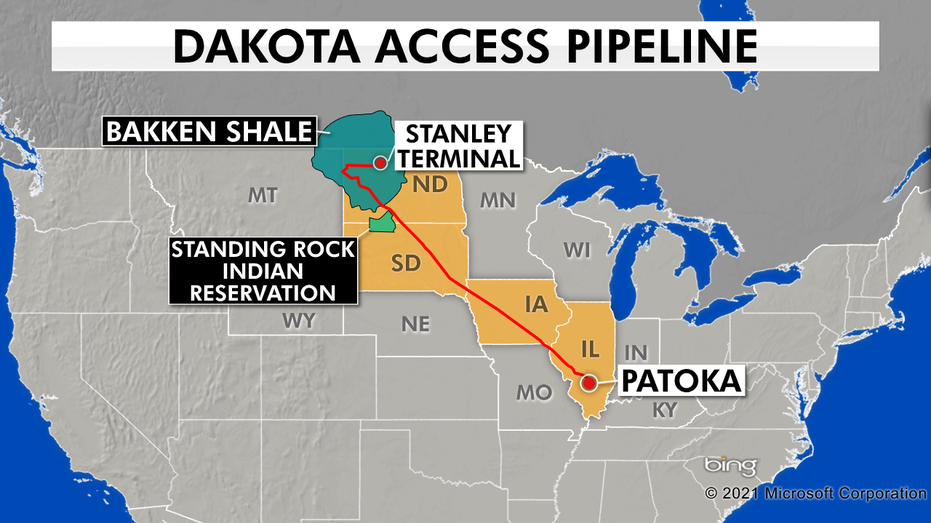Biden shutting Dakota Access pipeline would cause food prices to spike
The pipeline is currently under environmental review
President Biden shutting down the Dakota Access pipeline would result in Americans paying higher prices at the supermarket, according to experts.
The Biden administration will decide the fate of the Dakota Access pipeline, which was approved by former President Donald Trump in 2017 after being denied by former President Barack Obama, following a court-ordered environmental review.
AFTER KEYSTONE CANCEL, IS DAKOTA PIPELINE NEXT?
More than 200 celebrities recently sent a letter to Biden asking him to permanently shut the pipeline due to its impact on the environment and its impact on the Indigenous people who live in the area.
JET SETTING CELEBRITIES ARE TRYING TO KILL DAKOTA PIPELINE
The Biden administration did not respond to FOX Business’ request for comment.
BIDEN CLIMATE ACTIONS TO JOLT ELECTRICITY PRICES
The Dakota Access pipeline transports 570,000 barrels of oil each day from the Bakken Shale in North Dakota through South Dakota, Iowa and to an oil terminal in Illinois. It is the safest and most efficient way to transport the oil, according to operator Energy Transfer Partners.

Efforts to stop the delivery of that energy will “hit the American people directly in the pocketbook,” said Frank Macchiarola, senior vice president of policy, economics and regulatory affairs at the American Petroleum Institute.
Agricultural economist Elaine Kub said in a legal filing last fall that shutting down the Dakota Access pipeline would cost Corn Belt farmers more than $1 billion in annual revenue and “drive up food costs for consumers” as oil would command keyspace on railroad cars needed to transport agricultural products long distances.
Shipping corn from Minneapolis to Portland costs $1.31 per bushel by rail, but would cost $3.84 by truck, Kub said.
BIDEN'S KEYSTONE XL PIPELINE ORDER COSTS HUNDREDS MORE OIL WORKER JOBS
The American Farm Bureau Federation “anticipates increased transportation costs for agriculture as a result of the increased transportation competition between agriculture products and oil,” a spokesperson told FOX Business. The organization said it could not estimate how much costs would increase until more data was available.
Transporting oil by pipeline is not only more cost-effective but also better for the environment. A 2017 study published by Environmental Science and Technology found “pipeline transportation produced between 61% and 77% fewer GHG [greenhouse gas] emissions than by rail.”
The possibility for higher commodity prices has not gone unnoticed on Wall Street where the consensus is now calling for a bull market at least partially due to Biden’s climate actions.
The upswing in prices will stem from a recovering economy as well as loose monetary and fiscal policy contributing to a weaker dollar and higher inflation which are “unintended consequences of environmental policies and their friction with physical constraints related to energy consumption and production,” wrote Marko Kolanovic, a quant strategist at J.P. Morgan.
BIDEN CLIMATE CHANGE FIGHT TO FUEL COMMODITIES SUPERCYCLE
Biden last month revoked the permit for the Keystone XL pipeline amid a slew of executive orders aimed at transitioning the U.S. economy away from fossil fuels and towards renewable energy. Other actions included temporarily banning new leases and permits for drilling oil and gas on federal lands and waters and reentering the U.S. into the 2016 Paris Climate Agreement.
“The fact of the matter is that America needs energy for its everyday standard of living and that energy is going to come from somewhere,” Macchiarola said. “Any efforts to either stifle our infrastructure system or our exploration and production system, all of that accrues to the benefit of someone else, not the American people.”




















